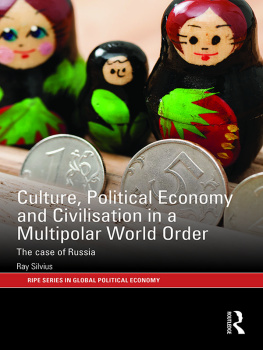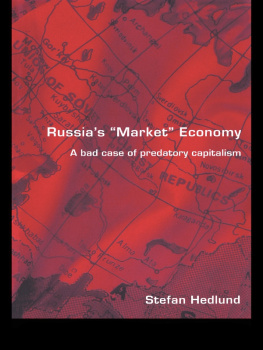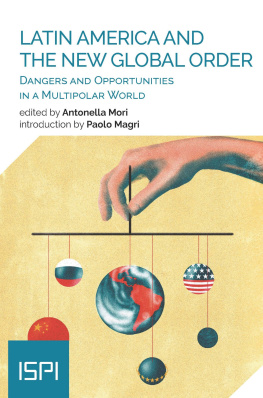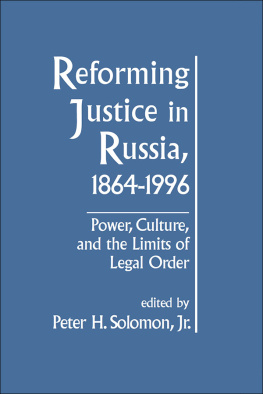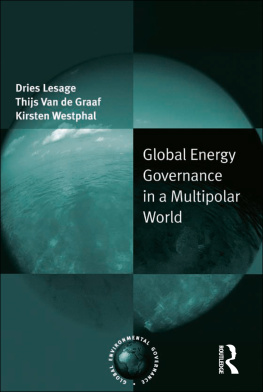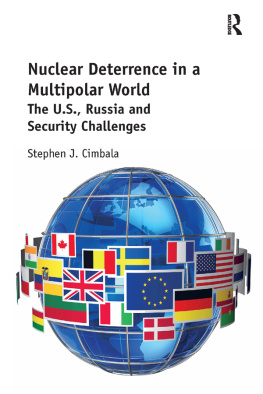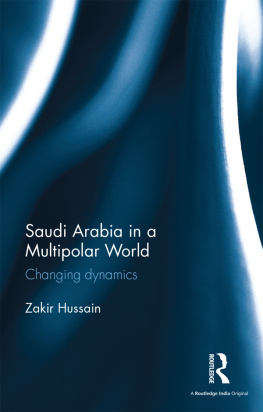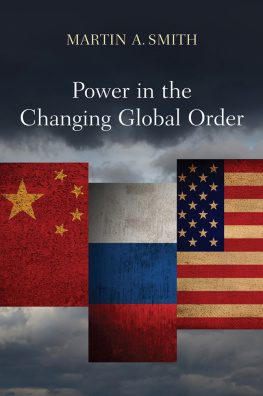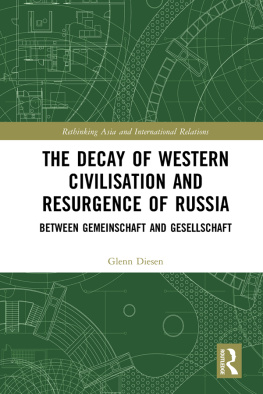Culture, Political Economy and Civilisation in a Multipolar World Order
This book demonstrates how Russias multifaceted rejection of American unipolarity and de-territorialised neo-liberal capitalism has contributed to the gestation of the present multipolar moment in the global political economy. Analysing Western world order precepts via the actions of a powerful, albeit precarious, national political economy and state structure situated on the periphery of Western world order, Silvius explores the manner in which culture and ideas are mobilised for the purposes of national, regional and international political and economic projects in a post-global age.
The book:
Explains and analyses the tensions of post-Soviet Russias integration into, and simultaneous partial rejection of, the capitalist global political economy.
Provides an overview of the social, political and historical origins of Russian samobytnost (uniqueness) after the fall of the Soviet Union and demonstrates their significance to contemporary understandings of world order.
Explores how structures of cultural difference and practices of cultural differentiation interact with the normative legacies of American hegemonic aspirations in contemporary world order structures.
Evaluates how cultural and civilisational representations are mobilised for state-projects and their corresponding regional and international dimensions within the global political economy.
This book will be of great interest to students and scholars of Russian Foreign Policy, IPE and comparative political economy.
Ray Silvius is an Assistant Professor in the Department of Political Science at the University of Winnipeg, Canada. He writes on international political economy, Russia, the emerging multipolar world order, and the political economy of refugees.
RIPE Series in Global Political Economy
Series Editors: James Brassett (University ofWarwick, UK), Eleni Tsingou (Copenhagen Business School, Denmark), Susanne Soederberg (Queens University, Canada) and Jacqueline Best (University of Ottawa, Canada)
The RIPE Series published by Routledge is an essential forum for cutting-edge scholarship in International Political Economy. The series brings together new and established scholars working in critical, cultural and constructivist political economy. Books in the RIPE Series typically combine an innovative contribution to theoretical debates with rigorous empirical analysis.
The RIPE Series seeks to cultivate:
Field-defining theoretical advances in International Political Economy
Novel treatments of key issue areas, both historical and contemporary, such as global finance, trade, and production.
Analyses that explore the political economic dimensions of relatively neglected topics, such as the environment, gender relations, and migration.
Accessible work that will inspire advanced undergraduates and graduate students in International Political Economy.
The RIPE Series in Global Political Economy aims to address the needs of students and teachers. Titles include:
Asymmetric Crisis in Europe and Possible Futures
Critical political economy and post-Keynesian perspectives
Edited by Johannes Jger and Elisabeth Springler
Hybrid Rule and State Formation
Publicprivate power in the 21st century
Edited by Shelley L. Hurt and Ronnie D. Lipschutz
Global Economic Governance and the Development Practices of the Multilateral Development Banks
Edited by Susan Park and Jonathan R. Strand
Ethics and Economic Governance
Using Adam Smith to understand the global financial crisis
Chris Clarke
Susan Strange and the Future of Global Political Economy
Power, control and transformation
Randall Germain
Culture, Political Economy and Civilisation in a Multipolar World Order
The case of Russia
Ray Silvius
First published 2017
by Routledge
2 Park Square, Milton Park, Abingdon, Oxon OX14 4RN
and by Routledge
711 Third Avenue, New York, NY 10017
Routledge is an imprint of the Taylor & Francis Group, an informa business
2017 Ray Silvius
The right of Ray Silvius to be identified as author of this work has been asserted by him in accordance with sections 77 and 78 of the Copyright, Designs and Patents Act 1988.
All rights reserved. No part of this book may be reprinted or reproduced or utilised in any form or by any electronic, mechanical, or other means, now known or hereafter invented, including photocopying and recording, or in any information storage or retrieval system, without permission in writing from the publishers.
Trademark notice: Product or corporate names may be trademarks or registered trademarks, and are used only for identification and explanation without intent to infringe.
British Library Cataloguing in Publication Data
A catalogue record for this book is available from the British Library
Library of Congress Cataloging in Publication Data
A catalog record for this book has been requested
ISBN: 978-1-138-95604-9 (hbk)
ISBN: 978-1-31566-591-7 (ebk)
As an intellectual project, this book began during my Ph.D. studies at Carleton University. I feel fortunate to have done my doctoral studies in an environment that was to my mind equal parts critical, permissive and heterogeneous.
My utmost appreciation is extended to my doctoral supervisor, Randall Germain, whose good humour, constant encouragement, and sage wisdom helped guide me first to a completed Ph.D., and subsequently to this completed project. There is no better mentor in the world of International Political Economy that I am aware of. Randall recognised some virtue in my initially clumsy formulations, perhaps thinking in his historical mode of thought that there was an important question worth broaching in all of this. I also thank Rianne Mahon and Piotr Dutkiewicz for their guidance and immensely helpful comments on early versions of my dissertation. Additional gratitude is extended to Piotr for helping to facilitate a number of crucial experiences in Moscow and Warsaw. Such experiences were indispensable, not necessarily for any data collected during them, but for giving me a further sense of the historical and geographical markers that shape ones thinking.
Likewise, I am grateful to Anastasia Nesvetailova, who, since serving as the external reviewer during my Ph.D. defense, has been a consistent supporter. My deepest appreciation also extends to my Russian language instructor at Carleton, Marina Sabanadze, for her patience and intelligence in assisting me with my Russian language studies at Carleton University.
This project has come to fruition while I have taught at the University of Winnipeg. During this period, I have enjoyed the immense fortune of having supportive friends and colleagues, as well as inquisitive students. The unflinching collegiality of Peter Ives must be acknowledged in particular. Peter might be known to most in academic spheres as a peerless scholar of Gramsci and language. He is equally capable at helping a young colleague learn the ropes in a department, in a university and in the academic publishing world. My thanks as well to Carlos Colorado, whose friendship and deep commitment to scholarly dialogue and interdisciplinary collaboration have made the day to day more enjoyable. Moreover, I extend my sincere appreciation to invaluable research support provided by my former University of Winnipeg Political Science students, Jessica Praznik, Mitchell Sherren and Dana Tucker. Similarly, thank you to another student, Terra Poole, for assisting with some of the final pesky formatting work on this manuscript.

